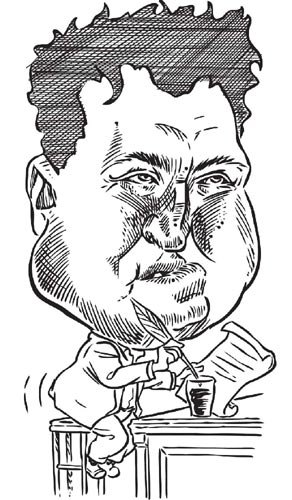
6 Brendan Behan
Brendan Behan is one of Ireland’s most famous writers, although he wrote only one good book and, by many accounts, had a minor role in a couple of plays that were to bear his authorial credit. Perhaps more to the point, his face adorns beer mats and brewers’ crests in the ‘literary’ pubs of Dublin, alongside the Great Masters like Joyce, Beckett, Kavanagh and Yeats. His name brings a smile to the faces of tourists seeking to get in touch with the soul of Ireland.
Borstal Boy is a moderately good book. It is funny and touching and displays to good effect the author’s sharp ear for dialogue. It offers the promise of a talent yet to flower but scant evidence to support the myth of Brendan Behan, which has endured for half a century while the works of better and far more prolific writers have faded from memory.
Had Behan not been a hellraiser, a drunk, a boor and a bollox, it is doubtful if anyone would remember him now. Borstal Boy would occasionally turn up in bargain bins. On the other hand, had he not been a hellraiser, a drunk, a boor and a bollox, he might well have written many more good books, even perhaps a few great ones. He was, by some accounts, a sensitive man, who could speak, it is said, French. But Patrick Kavanagh, who managed to combine a lifestyle of dissolution with the creation of a body of work that ranks alongside that of the greatest writers Ireland has produced, described Behan as ‘evil incarnate’.

Behan’s influence on Irish literature has been almost entirely negative. The myth of Brendan Behan suggests that drinking and literature go hand in hand – indeed, that they are the same thing. In no other country in the world would Behan be remembered as a great writer. People might reflect on the tragedy of his life, and the scandal of a promising talent gone to seed, but nobody would regard a book and a couple of middling plays as a sufficient oeuvre to justify claims of genius and greatness. In Ireland Behan is remembered not merely as a literary genius but also as a scintillating wit, who, it seems, was wont to deliver himself of lines like ‘Fuck the begrudgers!’ with effortless facility and aplomb.
In his book In My Own Time: Inside Irish Politics and Society, James Downey described the Behan he knew in the Dublin of the 1950s. Though an admirer of his published writing, he wrote, it was difficult to admire Behan as a human being. Downey described Behan as: ‘a gurrier unwashed, violent, delighting in every kind of misbehaviour, lazy, an abuser of his marvellous talents, and, worst, mean-spirited.’ He recalled the literary collossus in his final days swaggering from pub to pub, accompanied by hangers-on, ignoring his old friends, flaunting cheques from American publications for writings into which he had put minimum effort.
In Downey’s portrait it is possible to perceive something of the truth about Behan, including an explanation for his failure as a writer and success as a literary legend. According to Downey, Behan’s hugely successful play The Hostage was written chiefly by Joan Littlewood. The Quare Fellow was rewritten from the beginning by Carolyn Swift ‘from what amounted to no more than raw material supplied to her by Behan’. Swift staged the play at the Pike theatre, which she ran with her husband, Alan Simpson. Downey recalled that, when the play was eventually produced at the Abbey, Behan went on stage afterwards and made a drunken curtain speech in which he said that the Abbey production was the definitive version, making no mention of Swift and all the work she had done. ‘I thought that unforgivable,’ Downey concluded.
Much worse, however, is the legacy Behan bequeathed Irish society concerning the very idea of The Writer. Out of his flimsy catalogue of works there developed a myth that grows all the while. The myth of Behan created the literary bore to be found in landmark Dublin pubs like Davy Byrne’s and McDaids, a wet-brained, dandruffed species whose garrets might be imagined to strain at the seams with works of genius that nobody has the courage to publish. These inheritors of Behan seem not to have understood that, in order to qualify as a ‘writer’, it is somewhat important to have written and published books. Nor does it occur to any of these prodigies that anything of merit that their hero ever produced was conceived, if not actually written, while he was banged up for his activities as a ‘patriot’, or that the liberated Behan was a pretentious and self-aggrandizing writer, who worked only when the pubs were shut.
Yet these inheritors of the mantle of Brendan Behan remain unfazed and unapologetic about the dearth of evidence concerning their own ‘genius’. All it takes, they tell themselves, is one great book. Behan is their inspiration and their patron saint, the validation they need for a lifestyle with not even the remotest connection to literary endeavour. They sit glowering over their pints, complaining about the begrudgers who seek to do them down, dropping references to their ‘forthcoming’ novels for the benefit of gullible tourists who wet themselves to be in the company of these successors to the great ‘Broth of a Boy’. It is all unspeakably tedious, and lethal to any sense of the true purpose of writing, and further proof that the most reactionary institution in Ireland is neither a political party nor a church, but the public house, in which failure begets failure and erects plinths to the sources of its inspiration.